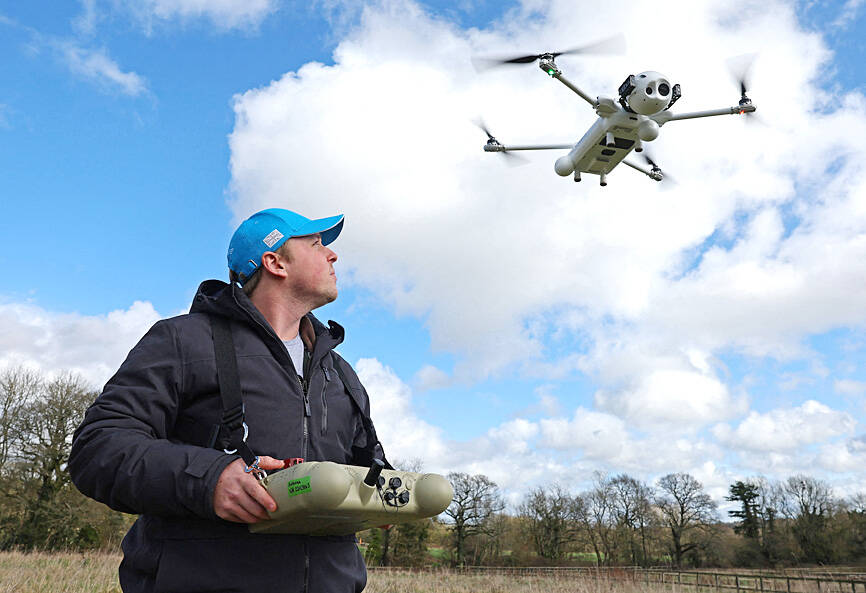In an anonymous warehouse in southern England, engineers at Evolve Dynamics are working on technology that could help keep Ukraine’s reconnaissance drones in the sky even after Russia tries to jam them electronically.
It is a small but important part of an international effort by Ukraine’s allies to support its drone program, which Kyiv hopes will give it the edge over a much larger enemy with many more resources at its disposal.
Companies in dozens of countries have supplied drones and drone parts to Ukraine. Some, like Evolve Dynamics, are also focusing on technological advances designed to counter Russia’s powerful electronic warfare capabilities.

Photo: Reuters
By developing alternative radio link algorithms, it aims to make it harder for Russia to jam the signal from its surveillance drones, rendering them useless.
Both sides have bolstered deployment of electronic warfare systems, which can disrupt the frequencies that feed commands from the pilot to the drone, making them drop out of the sky or miss their target.
“It’s a constant ping-pong game between adversaries,” said Evolve Dynamics chief executive Mike Dewhirst, who estimates there have been 85 upgrades made to the company’s Sky Mantis drones over the past two-and-a-half years.

Photo: Reuters
The UK, a staunch ally of Kyiv since Russia launched its full-scale invasion in February 2022, said it was the largest supplier of drones to Ukraine, and is working with Latvia to lead a European coalition to step up production.
Other allies, such as Sweden, the Netherlands and Norway, have also provided Ukraine with combat drones.
Ukraine has nurtured its own private military start-ups to innovate and build up their domestic industry as the war enters its third year.
About 200 drone makers are now in the country, and the Ukrainian Ministry of Strategic Industries has said the nation could make as many as 2 million drones this year.
With Evolve Dynamics, whose reconnaissance drones in Ukraine spy on enemy movements, military units receive parts and software updates directly from the company, allowing them, where possible, to make the changes themselves.
“We’re adding technology to existing drones, modifying them. It might be a software change, a hardware change,” Dewhirst said.
Immediate communication between defense companies and soldiers might become a more common feature of warfare given the rapid technological innovation, some military experts said.
The trend could have implications for everything from procurement to training.
“The technology is moving very quickly. I would say maybe a six week learning cycle on the battlefield,” said Nick Reynolds, research fellow in land warfare at the Royal United Services Institute, a London-based defense think tank. “Our procurement systems are not optimized for this.”
Last month, a military unit in Ukraine asked Evolve Dynamics to change its technology to make it safer for the pilot.
Working at the British site adorned with Ukrainian flags and messages of thanks from soldiers, staff worked out how to separate a drone’s radio box from its control.
Having sent instructions, the military unit were able to adopt the change within 24 hours of the request.
Dewhirst, who travels to Ukraine each month, decided to fund the modification after hearing that soldiers were going to pay for it themselves. Drone units in Ukraine often pay for their own equipment through private means or crowdfunding.
Dewhirst founded the company in 2014 when he was working with software engineers in Kyiv for a digital marketing start-up.
Evolve Dynamics has about 100 Sky Mantis surveillance drones flying in Ukraine, making it one of between five and 10 British significant suppliers of drones to Ukraine, the company said.
The UK has pledged to spend £325 million (US$410.26 million) to send 10,000 drones to Ukraine this year, and Evolve Dynamics hopes to win more of that work.
The privately owned company has supplied the British Royal Navy and some police forces, along with global oil and gas and wind turbine companies.

RUN IT BACK: A succesful first project working with hyperscalers to design chips encouraged MediaTek to start a second project, aiming to hit stride in 2028 MediaTek Inc (聯發科), the world’s biggest smartphone chip supplier, yesterday said it is engaging a second hyperscaler to help design artificial intelligence (AI) accelerators used in data centers following a similar project expected to generate revenue streams soon. The first AI accelerator project is to bring in US$1 billion revenue next year and several billion US dollars more in 2027, MediaTek chief executive officer Rick Tsai (蔡力行) told a virtual investor conference yesterday. The second AI accelerator project is expected to contribute to revenue beginning in 2028, Tsai said. MediaTek yesterday raised its revenue forecast for the global AI accelerator used

TEMPORARY TRUCE: China has made concessions to ease rare earth trade controls, among others, while Washington holds fire on a 100% tariff on all Chinese goods China is effectively suspending implementation of additional export controls on rare earth metals and terminating investigations targeting US companies in the semiconductor supply chain, the White House announced. The White House on Saturday issued a fact sheet outlining some details of the trade pact agreed to earlier in the week by US President Donald Trump and Chinese President Xi Jinping (習近平) that aimed to ease tensions between the world’s two largest economies. Under the deal, China is to issue general licenses valid for exports of rare earths, gallium, germanium, antimony and graphite “for the benefit of US end users and their suppliers

Dutch chipmaker Nexperia BV’s China unit yesterday said that it had established sufficient inventories of finished goods and works-in-progress, and that its supply chain remained secure and stable after its parent halted wafer supplies. The Dutch company suspended supplies of wafers to its Chinese assembly plant a week ago, calling it “a direct consequence of the local management’s recent failure to comply with the agreed contractual payment terms,” Reuters reported on Friday last week. Its China unit called Nexperia’s suspension “unilateral” and “extremely irresponsible,” adding that the Dutch parent’s claim about contractual payment was “misleading and highly deceptive,” according to a statement

Artificial intelligence (AI) giant Nvidia Corp’s most advanced chips would be reserved for US companies and kept out of China and other countries, US President Donald Trump said. During an interview that aired on Sunday on CBS’ 60 Minutes program and in comments to reporters aboard Air Force One, Trump said only US customers should have access to the top-end Blackwell chips offered by Nvidia, the world’s most valuable company by market capitalization. “The most advanced, we will not let anybody have them other than the United States,” he told CBS, echoing remarks made earlier to reporters as he returned to Washington